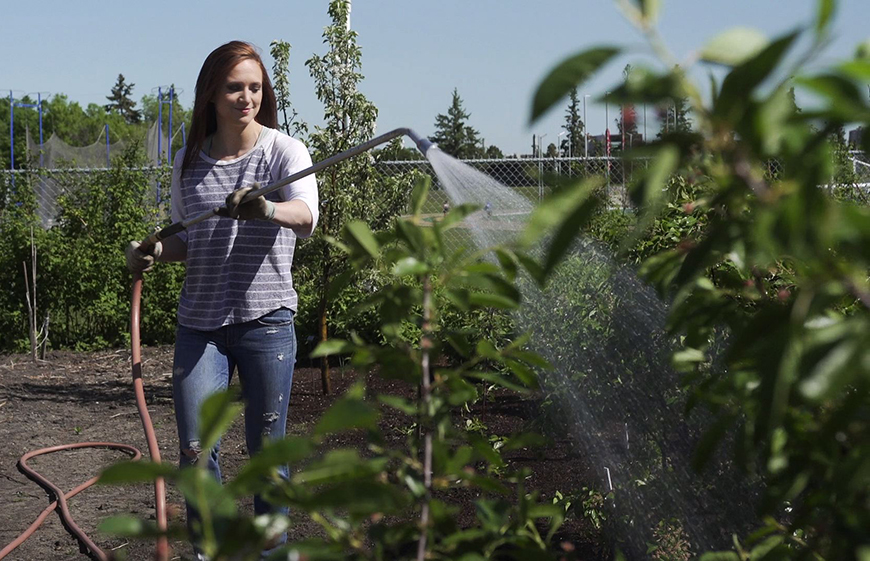
Ashley Sarauer realized her passion for sustainability issues after a stint with the Campus Food Bank.
Some of the most meaningful and lasting lessons that Ashley Sarauer learned as an undergrad developed on-campus, but outside the classroom.
Sarauer is the founder of the student group Student Energy at the University of Alberta, a club she started in 2016 with the mission of providing a space where students can explore topics on energy and become inspired to "contribute to projects that reinforce sustainable energy solutions."
She also helped organize the Alberta Student Energy Summit 2016, a conference held in Calgary. Designed to expand the conversation on energy provincewide, the event attracted students from across Alberta.
Yet, when she first started at the U of A, these projects were not at all on her mind.
Before pursuing her degree in environmental and conservation sciences, Sarauer studied nutrition and volunteered with the Campus Food Bank. As a team leader there, she picked up leadership skills that were immediately useful but also some important information about herself that's now guiding her into her future.
"The Sustainable Food Initiative is where I developed my interest in environmental sciences," she says. "A lot of people there were interested in sustainable food systems."
Nikki Way, who led the group at the time and is now an analyst for the Pembina Institute, was a major source of inspiration for Sarauer. "Her passion really stood out to me. I wanted to be like that. So I just started taking courses towards that degree and my marks started going up."
Sarauer changed her degree's major in her third year and doesn't regret it. She remembers immediately relating to her first environmental sciences course on the history of national parks and the philosophies of Henry David Thoreau. "I connected with the material," she says.
"For my fourth year I had to do a lot of catching up, so I did a six- and seven-courses workload over my two semesters."
Determined to succeed in her new program, Sarauer also duplicated the passion she admired in Way, and created the Student Energy group.
"Essentially the topic [of the group] was educating people on the topic of energy." One of the club's first excursions was a tour of the building where the university's energy is generated.
Establishing the non-profit student group also meant Sarauer had to create a constitution, bylaws and assign different roles to govern the group.
Her hard work paid off.
The club's first meeting drew 60 students and professors. Sarauer told them she wanted to bring in speakers to educate the group and she polled the participants for what they wanted to learn. The crowd was interested in everything from geothermal energy to local food movements.
"Everyone was so excited and the room was buzzing," says Sarauer.
Building on the enthusiasm she felt at the Student Energy Club, she represented the University of Alberta in helping plan the Alberta Student Energy Summit in Calgary in conjunction with the University of Calgary and Mount Royal University.
Minister of the Environment Shannon Phillips, was in attendance and the event was a huge success.
Before her final year, Sarauer went to England to fill an internship at the University of Leeds. There she worked on an environmental sociology project researching the coal phase-out in an effort to see how that might apply to Alberta.
She returned in 2016 to complete her degree and will convocate on June 15.
"I finished strong and made a lot of strong connections with professors," she says. Encouraged by those professors and her love of environmental sciences, Sarauer has already begun to work on her master's degree in the Department of Resource Economics and Environmental Sociology, researching the relationship between internal trade and energy in the Canadian economy.
Reflecting on how she has been able to find herself working in a field she feels passionately about, Sarauer says, "I was interested, so I got involved."